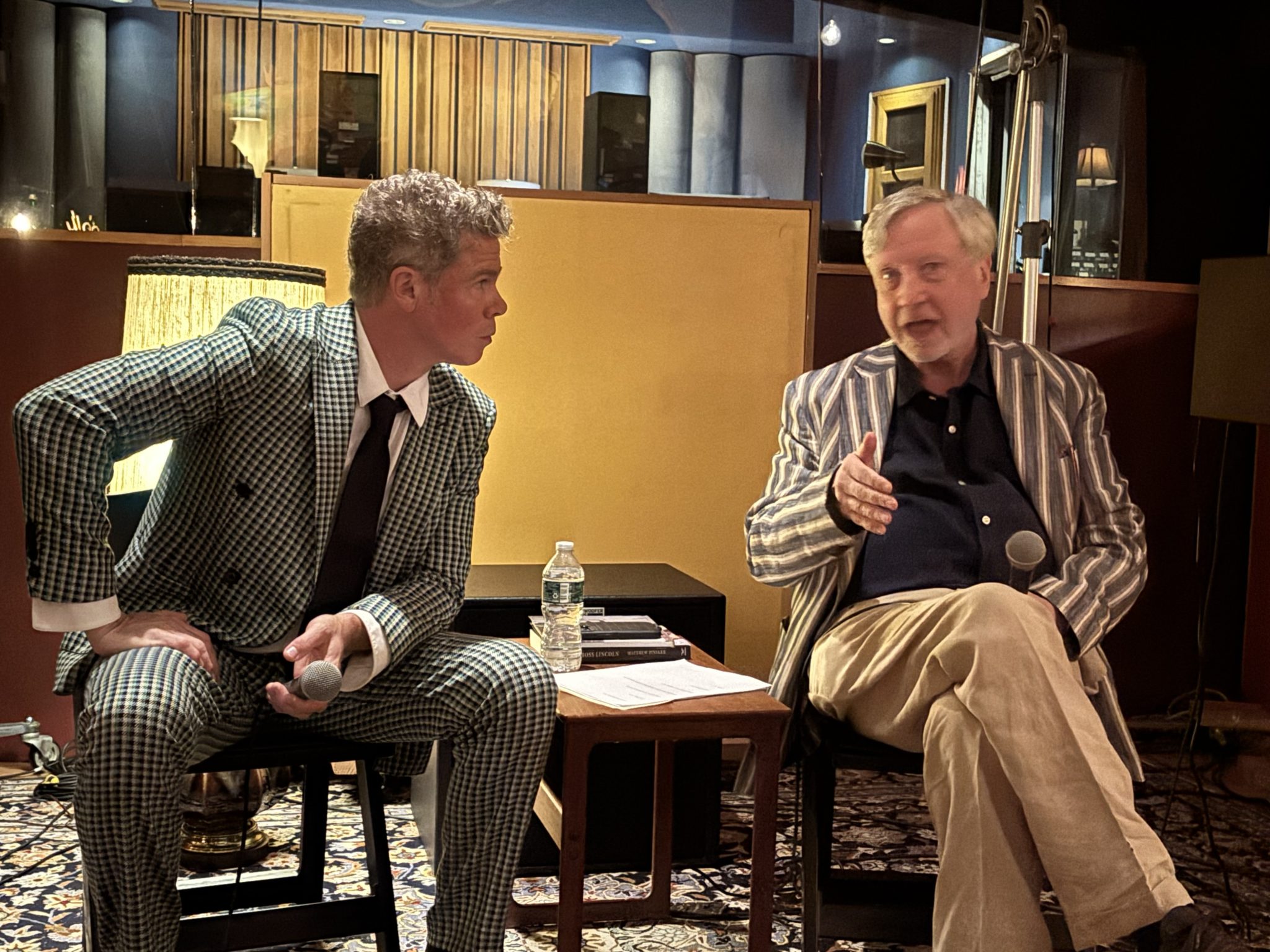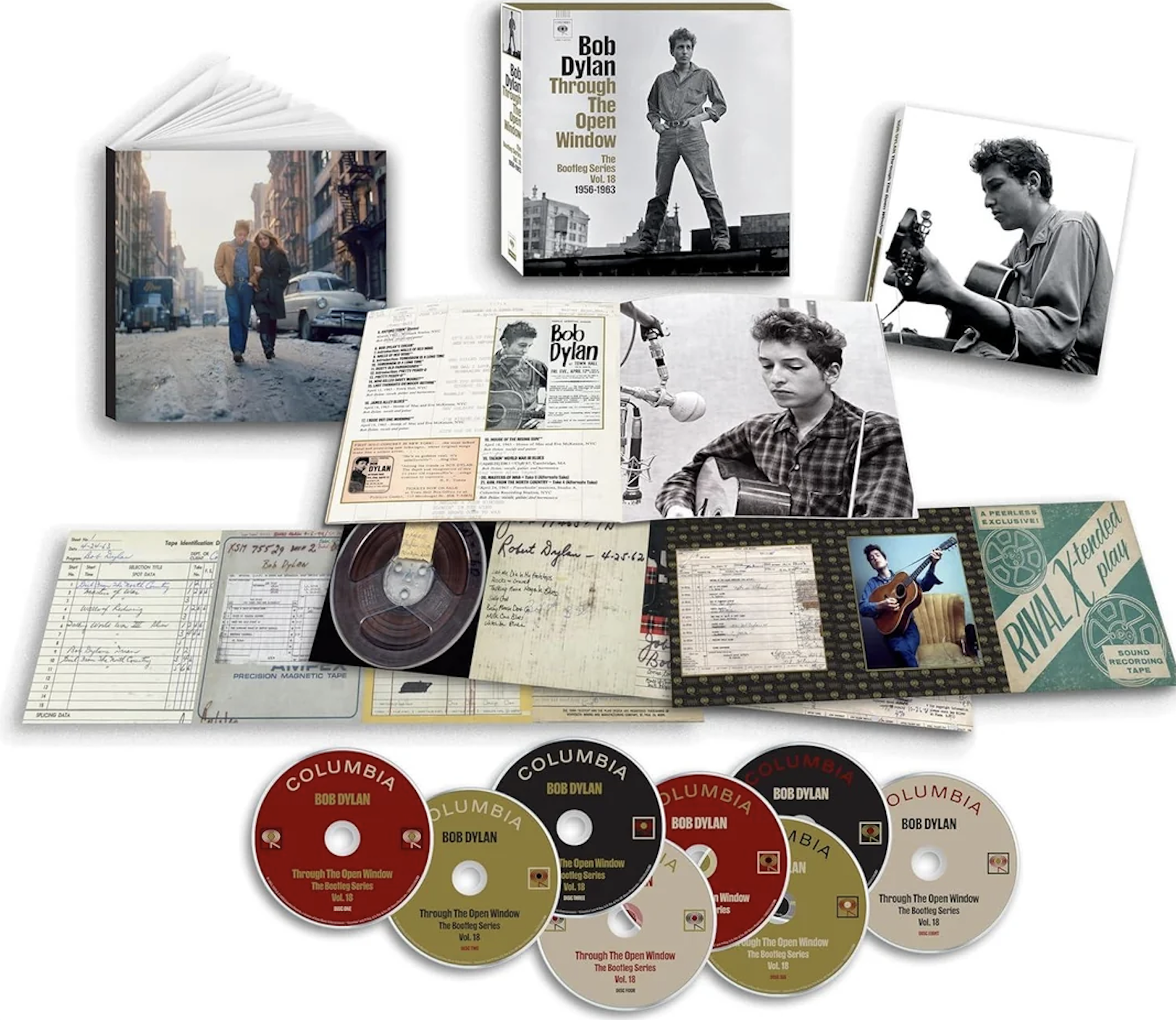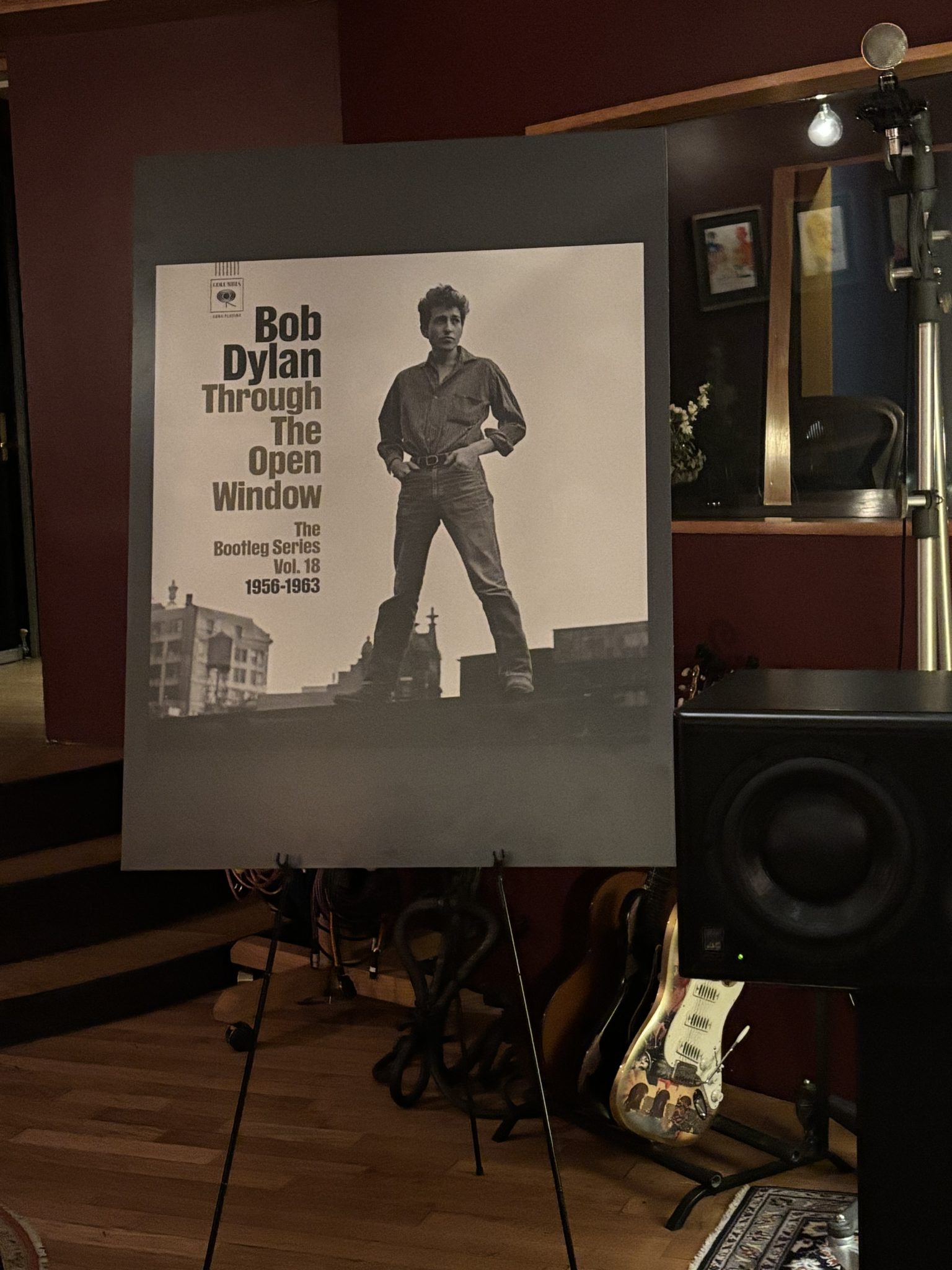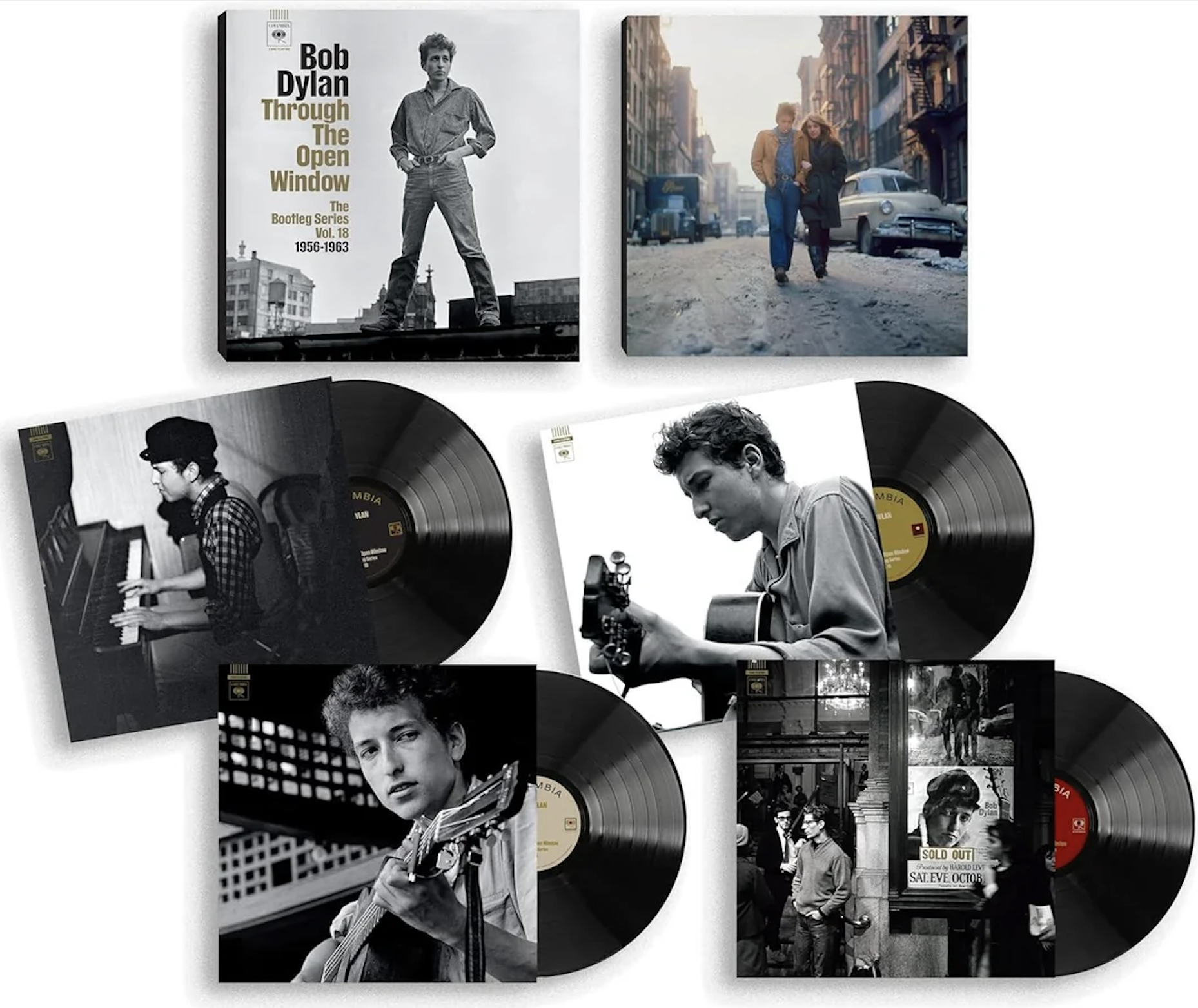- Music
- 17 Sep 25
Album Preview: Bob Dylan: Through the Open Window: The Bootleg Series Vol. 18

Without question, this is a marvellous new collection of early Bob Dylan works. We keep learning new things about how to do this music thing from the Great Master.
Early this morning, Columbia Records announced the release on October 31 of the latest installment of Bob Dylan’s official bootleg series. As the author of the liner notes, Sean Wilentz, said last night, “People have wanted this record for a very long time.”
Here’s why. It covers Dylan’s career as a musician from its very beginning, when he was a 15-year-old Bob Zimmerman in Hibbing, Minnesota, to his triumphant Carnegie Hall concert of October 26, 1963: where it all started, and how Dylan rose through a combination of genius, ambition, and extremely hard work, to become the king of New York City’s folk music scene.
The box set was announced thus:
“Through The Open Window tells the story of Dylan’s emergence and maturation as a songwriter and performer, from Minnesota to the Greenwich Village bohemia in the early 1960s. Arriving amidst a global resurgence in appreciation for Dylan, the collection includes rare Columbia Records outtakes, recordings made at club dates, in tiny informal gatherings, in friends’ apartments, and at jam sessions in long-gone musicians’ hangouts. Many of the recordings are exceedingly rare; others have never been presented in any form.
“The box set is a unique account of Dylan’s early years, when he honed his talent, and transformed traditional folk songs and lyric sketches into some of his greatest and most enduring songs, including ‘Blowin’ in the Wind’ and ‘The Times They Are A-Changin’.’ It concludes with a previously unreleased recording, in its entirety, of Dylan’s landmark concert at Carnegie Hall on October 26, 1963. A culmination of Dylan’s exceptional early rise, that concert also marked the end of the beginning of Dylan’s long career.
“’Of that time and those places, this collection is just a fragment,’” writes author and historian Sean Wilentz in his 125-page liner notes essay. ‘Even so, as an aural record of an artist becoming himself—or in Dylan’s case, his first of many artistic selves—the collection aims to collapse time and space, not as a nostalgic reverie but as a living connection between the past and the present, the old and the new, which are never as distinct as we might think.’
“The 8CD Deluxe set includes 139 tracks – 48 never-before released performances, as well as 38 super-rare cuts plus a hardcover book with extensive liner notes by Sean Wilentz and over 100 rare photographs. The 2CD and 4LP highlight editions include 42 tracks.”

Wilentz and musician Josh Ritter, who was pleasantly surprised when Dylan performed a cover of his song 'Only A River' in 2023, supplied a preview of Through The Open Window, 1956-1963 in New York last night.
'Let The Good Times Roll', Terlinde Music Shop, Saint Paul, Minnesota, December 24, 1956.
Dylan and his friends Howard Rutman and Larry Kegan, calling themselves The Jokers, paid a quarter to record this in a little recording booth on Christmas Eve. It’s joyful, rambunctious, with Dylan singing lead on the 1946 blues tune by Sam Theard and Fleecie Moore, and putting his whole heart into the “C’mon, baby” and plinky piano playing every moment.
'K.C. Moan', with Danny Kalb, Madison, Wisconsin, 1960.
Dylan had moved to Minneapolis for college, and spent most of his time not in the classroom but in the coffeehouses of Dinkytown like the Ten O’Clock Scholar, soaking up songs and making friends in the folk scene. He left for New York City but got as far as Chicago, and then circled back to Madison. There he met another teenaged musician, Danny Kalb, who’d already been to New York and met Dave Van Ronk, and studied with him. Kalb and Dylan perform this song in a sweet trading-off of lyrics and licks, with Kalb already showing his immense skill as a blues guitarist. “Play it, Bob,” he encourages Dylan, and the yeahs and yips show a camaraderie that is the real hallmark of all folk music. In this track, Josh Ritter hears “the beginnings of ‘Duquesne Whistle',” and remarks that for a musician, “like a bowerbird, you move your shiny thing from nest to nest.”
Ritter: “It’s the feeling of camaraderie and competition that makes you compose… you grind your teeth on each other.”
'Talkin’ Bear Mountain Picnic Massacre Blues', The Gaslight Café, New York, 1961.
This track is from Terri Thal’s tape, recently sold at auction. She was Dylan’s first manager – as well as Dave Van Ronk’s wife – and Thal used the tape to play it for club owners outside New York to try to get gigs for Dylan. It’s a goofy, silly song about a free-for-all that actually broke out on a Hudson River steamboat, and Dylan’s delivery makes the audience guffaw. He turns “I’m skeered a’ bears” into a drawn-out couplet; he adds a little sarcastic “yippee” after the line “fun for all.”
Wilentz: “He was also a stand-up comic.” Wilentz reminds you that the Village coffeehouses, in this day, had progressed from Beat poets to stand-up comics like Joan Rivers, Woody Allen, and above all Lenny Bruce. Dylan’s patter between songs and this song itself are part of that comic world; according to Wilentz there is a “four-minute monologue” preceding the song.
'Man of Constant Sorrow', rehearsal, Columbia Studios, New York, November 1961.
Dylan went into the studio with the legendary John Hammond, who was producing the record. He hits the song like a train, hammering the lyrics and lingering over every vowel: boooooorn and partly raised; frieeeeeeeends say I’m a stranger. His harmonica playing is unbelievably passionate, hard-driving and fierce. At the end, Hammond asks, “Has it ever been recorded?” Dylan replies, “Not that way.” He doesn’t know the author, but says Judy Collins has recorded it for Elektra. Hammond snaps out an order: “Find out from Elektra who wrote the damn thing.”
Wilentz: “He’s really learned a lot about how to play the guitar and blow a harmonica in six or seven months.” Here Wilentz played a brief clip of Woody Guthrie’s 'Ramblin’ Round'.
Ritter: “There’s a common language of Hank Williams, and country, that wasn’t that old at the time.”
Dylan is inserting then-contemporary country into the old folk songs here, infusing what Guthrie and other folksingers had recorded with something new.
'Blowin’ In the Wind', Gerdes Folk City, New York, April 16, 1962.
Dylan introduces the song: “This is, uh, I wrote this one… I didn’t actually write it I just recorded it….It ain’t a pro-test song.” A floating harmonica starts the performance. Dylan almost stops touching the guitar as he sings, letting his voice bring the words out almost a capella: he wants you to hear every single word and remember it. Later, just the lightest touch on the strings to accompany the brief song. He hasn’t finished all the verses. This is his first public performance of what would become his best-known song. The entire set from Gerdes this day is included on Through the Open Window, 1956-1962: 'Honey, Just Allow Me One More Chance', 'Talkin’ New York', 'Corinna, Corinna', and 'Blowin’ In the Wind'. Most performers got to do two songs. Dylan got to do four.
'Tomorrow Is A Long Time', Minneapolis, July 1962.
Dylan introduces this song at a party, where he was recorded performing it by his friend Tony Glover. Dylan’s girlfriend Suze Rotolo had left to study in Perugia for the rest of the year, and he was bereft. He left the apartment they shared on West 4th Street in New York and returned to Minneapolis. “The last verse is the one I wrote the whole song about,” Dylan says, telling everyone that his girlfriend is in Europe and, “Sometimes it gets bad, most of the time it don’t.” Eagerly, he consoles himself that “She’ll be back September 1st.” In an interesting detail, he insists, “This is way outa my style….this is the Pete Seeger style.” A work in progress unveils as he sings:
"Only if the sky would fall tomorrow
Only if the river was dry
Only if the rainbow lost its colors
Then I might go home again…."
Dylan’s guitar is gentle and twangy as a sitar, making the plaint feel exotic as well as heartsore.

'Liverpool Gal', London, December 1962.
Dylan made his first trip to London to be in a BBC television play called Madhouse on Castle Street. Upon arriving, he found it to be a terrible play, and refused to take the role of Lenny. Instead, he became a character called Bobby, and sang a song or two. He thoroughly enjoyed the city; according to Wilentz he went shopping and bought a number of hats on the already-swinging Carnaby Street. Dylan also spent most of his time with Pauline Boty, a superb artist and a stunningly beautiful woman. John Hughes has persuasively argued that 'Liverpool Gal' is in large part a tribute to Boty, and I’m convinced. It was in London that Dylan experienced what Wilentz terms “Anglo-Celtic balladry” – and he was hooked for life.
Wilentz: Martin Carthy taught him 'Scarborough Fair'.
'I Rode Out One Morning', McKenzie Apartment, New York, 1963.
This song is based on 'My Horses Ain’t Hungry, They Won’t Eat Your Hay', a folk song that slips and slides under many different titles. Dylan’s composing as you listen, working through lyrics and turning in some of the best guitar playing I’ve ever heard him do. He used the informal recordings made in friends’ apartments to work from later, as he revised and completed his songs.
"My hands they were dirty and my hair it was messed
I came out from the east and went down to the west."
Wilentz: He never stops honing his chops….Genius takes a lot of work.
'Boots of Spanish Leather', slated by Tom Wilson, August 1963.
Wilson’s gentle, patient voice soothingly announces this first take of 'Boots of Spanish Leather'. Dylan’s voice is calm, resigned, distant. His guitar playing continues to amaze: its grace is powerful here. His wish that his lover carry herself “back to me unspoiled” from “across that lonesome ocean” is unforgettably phrased.
'The Lonesome Death of Hattie Carroll', Carnegie Hall, October 26, 1963.
Through The Open Window, 1956-1963 includes the entire Carnegie Hall concert at last. Some tracks have been released, some bootlegged, over the decades: at last here it is, and clear as a bell. The sound quality of the songs I’ve heard from this album is unmatched, thanks to the co-producers: the legendary Steve Berkowitz, who has co-produced many of Dylan’s official bootlegs, and Wilentz. Dylan introduces this song by name, very slowly, and performs it slowly, so everyone can not only hear, but truly listen. I’ve never heard him deliver the word “philosophize” with such searing scorn. For hours afterward, I thought about the line “You who philosophize disgrace and criticize all fears,” in a way I’ve never done before. Talk about a song for our times.
Who is writing the songs today, the songs for people done to death like Hattie Carroll, slain by a cane, or a knife, or a gun? Who is taking the responsibility that Bob Dylan took in 1963?
Wilentz: “[The Carnegie Hall concert] is a culmination of everything that’s come before…. ‘Hattie Carroll’ is the last song in the set before his encore. People are screaming…. then they hush. He sings a song he really wants to get over.”
When Bob Dylan wants to get a song over, when he wants you to pay attention and listen to it, and think about what he’s singing, remember it and ponder it and share it, there’s no one better at doing this in the history of recorded music. On Through The Open Window, 1956-1963, you have the benedictory experience of having him do this again and again and again. He’s learning how, perfecting both performance and composition, and this is where all the ladders start.
Disc 1
Let the Good Times Roll (Terlinde Music Shop, St. Paul, MN, 1956)
I Got a New Girl (Informal Recording, Hibbing, MN, 1959)
San Francisco Bay Blues (Informal Recording, Minneapolis, MN, 1960)
Jesus Christ (Informal Recording, Minneapolis, MN, 1960
East Virginia Blues (Informal Recording, Madison, WI, 1960)
K.C. Moan (Informal Recording, Madison, WI, 1960)
Bob Dylan with Danny Kalb
Hard Travelin’ (Informal Recording, Madison, WI, 1960)
Bob Dylan with Danny Kalb
Pastures of Plenty (Informal Recording, East Orange, NJ, 1961)
Remember Me (Informal Recording, East Orange, NJ, 1961)
Song to Woody (The Gaslight Cafe, NYC, 1961)
Talkin’ Bear Mountain Picnic Massacre Blues (The Gaslight Cafe, NYC, 1961)
Ain’t No Grave (Informal Recording, NYC, 1961)
I Ain’t Got No Home (University of Minnesota, Minneapolis, MN, 1961)
Death Don’t Have No Mercy (Party, Minneapolis, MN, 1961)
Devilish Mary (Party, Minneapolis, MN, 1961)
Introduction: Riverside Church (Riverside Church, NYC, 196)
Handsome Molly (Riverside Church, NYC, 1961)
Introduction: See That My Grave Is Kept Clean (Gerdes Folk City, NYC, 1961)
See That My Grave Is Kept Clean (Gerdes Folk City, NYC, 1961)
The Girl I Left Behind (Gerdes Folk City, NYC, 1961)
Introduction: Pretty Boy Floyd (Gerdes Folk City, NYC, 1961)
Pretty Boy Floyd (Gerdes Folk City, NYC, 1961)
Bob Dylan with Jim Kweskin
Railroading on the Great Divide (Gerdes Folk City, NYC, 1961)
Bob Dylan with Jim Kweskin
Introduction: Fixin’ to Die (Folklore Center, NYC, 1961)
Fixin’ to Die (Folklore Center, NYC, 1961
Bob Dylan with Dave Van Ronk
I’ll Fly Away (Carolyn Hester Alternate Take, NYC, 1961)
Carolyn Hester with Bob Dylan
Disc 2
Introduction: In the Pines (Carnegie Chapter Hall, NYC, 1961)
In the Pines (Carnegie Chapter Hall, NYC, 1961)
Gospel Plow (Carnegie Chapter Hall, NYC, 1961)
Introduction: Young But Daily Growing (Carnegie Chapter Hall, NYC, 1961)
Young But Daily Growing (Carnegie Chapter Hall, NYC, 1961)
Man on the Street (Carnegie Chapter Hall, NYC, 1961)
This Land Is Your Land (Carnegie Chapter Hall, NYC, 1961)
Pretty Polly (Carnegie Chapter Hall, NYC, 1961)
Man of Constant Sorrow (Bob Dylan Rehearsal, NYC, 1961)
House Carpenter (Bob Dylan Outtake, NYC, 1961)
You’re No Good (Bob Dylan Alternate Take, NYC, 1961)
He Was a Friend of Mine (Bob Dylan Outtake, NYC, 1961)
Ramblin’ Round (Bob Dylan Outtake, NYC, 1961)
Story: East Orange, New Jersey (Party, Minneapolis, MN, 1961)
Stealin’ (Party, Minneapolis, MN, 1961)
Po’ Lazarus (Party, Minneapolis, MN, 1961)
Dink’s Song (Party, Minneapolis, MN, 1961)
I Was Young When I Left Home (Party, Minneapolis, MN, 1961)
In the Evening (Party, Minneapolis, MN, 1961)
Baby, Let Me Follow You Down (Party, Minneapolis, MN, 1961)
Cocaine (Party, Minneapolis, MN, 1961)
Disc 3</strong>
The Death of Emmett Till (WBAI-FM, NYC, 1962)
Conversation: Folksinger’s Choice, 1 (WBAI-FM, NYC, 1962)
Roll On, John (WBAI-FM, NYC, 1962)
Conversation: Folksinger’s Choice, 2 (WBAI-FM, NYC, 1962)
Hard Times in New York Town (WBAI-FM, NYC, 1962)
Talkin’ John Birch Paranoid Blues (Informal Recording, NYC, 1962)
Ballad of Donald White (Informal Recording, NYC, 1962)
Midnight Special (The Midnight Special Rehearsals, NYC, 1962)
Harry Belafonte with Bob Dylan
Midnight Special (The Midnight Special Alternate Take, NYC, 1962)
Harry Belafonte with Bob Dylan
Wichita (Three Kings and the Queen Album Version, NYC, 1962)
Big Joe Williams with Bob Dylan
It’s Dangerous (Kings and the Queen, Volume Two Album Version, NYC, 1962)
Victoria Spivey with Bob Dylan and Big Joe Williams
Honey, Just Allow Me One More Chance (Gerdes Folk City, NYC, 1962)
Talkin’ New York (Gerdes Folk City, NYC, 1962)
Corrina, Corrina (Gerdes Folk City, NYC, 1962)
Deep Ellum Blues (Gerdes Folk City, NYC, 1962)
Introduction: Blowin’ in the Wind (Gerdes Folk City, NYC, 1962) – 0:00:19
Blowin’ in the Wind (Gerdes Folk City, NYC, 1962)
Rambling, Gambling Willie (Freewheelin’ Outtake, NYC, 1962)
(I Heard That) Lonesome Whistle (Freewheelin’ Outtake, NYC, 1962)
Rocks and Gravel (Freewheelin’ Outtake, NYC, 1962)
Paths of Victory (Broadside Office, NYC, 1962)
Train A-Travelin’ (Broadside Reunion Album Version, NYC, 1962)
Hiram Hubbard (The Finjan, Montreal, 1962)
Quit Your Low Down Ways (The Finjan, Montreal, 1962)
Let Me Die in My Footsteps (The Finjan, Montreal, 1962)
Ramblin’ on My Mind (The Finjan, Montreal, 1962)
Blue Yodel No. 8 (Mule Skinner Blues) (The Finjan, Montreal, 1962)
Disc 4
Baby, Please Don’t Go (Freewheelin’ Outtake, NYC, 1962)
Worried Blues (Freewheelin’ Outtake, NYC, 1962)
Baby, I’m in the Mood for You (Freewheelin’ Outtake, NYC, 1962)
Bob Dylan’s Blues (Freewheelin’ Alternate Take, NYC, 1962)
Introduction: Tomorrow Is a Long Time (Party, Minneapolis, MN, 1962)
Tomorrow Is a Long Time (Party, Minneapolis, MN, 1962)
This Land Is Your Land – The Last Verses (Party, Minneapolis, MN, 1962)
Long Time Gone (Party, Minneapolis, MN, 1962)
A Hard Rain’s A-Gonna Fall (The Gaslight Cafe, NYC, 1962)
Don’t Think Twice, It’s All Right (The Gaslight Cafe, NYC, 1962)
Barbara Allen (The Gaslight Cafe, NYC, 1962)
The Cuckoo (The Gaslight Cafe, NYC, 1962)
That’s All Right (Freewheelin’ Outtake, NYC, 1962)
Mixed-Up Confusion (Single Alternate Take, NYC, 1962)
Ballad of Hollis Brown (Freewheelin’ Outtake, NYC, 1962)
Kingsport Town (Freewheelin’ Outtake, NYC, 1962)
Whatcha Gonna Do? (Freewheelin’ Outtake, NYC, 1962)
Hero Blues (Freewheelin’ Outtake, NYC, 1962)
I Shall Be Free (Freewheelin’ Alternate Take, NYC, 1962)
Disc 5
The Ballad of the Gliding Swan (BBC-TV, London, 1963)
Only a Hobo (Broadside Ballads Album Version, NYC, 1963)
John Brown (Broadside Ballads Album Version, NYC, 1963)
All Over You (Informal Recording, NYC, 1963)
Bob Dylan with Happy Traum and Gil Turner
Oxford Town (Witmark Demo, NYC, 1963)
Bob Dylan’s Dream (Town Hall, NYC, 1963)
Introduction: Walls of Red Wing (Town Hall, NYC, 1963)
Walls of Red Wing (Town Hall, NYC, 1963)
Introduction: Tomorrow Is a Long Time (Town Hall, NYC, 1963)
Tomorrow Is a Long Time (Town Hall, NYC, 1963)
Dusty Old Fairgrounds (Town Hall, NYC, 1963)
Introduction: Pretty Peggy-O (Town Hall, NYC, 1963)
Pretty Peggy-O (Town Hall, NYC, 1963)
Who Killed Davey Moore? (Town Hall, NYC, 1963)
Last Thoughts on Woody Guthrie (Town Hall, NYC, 1963)
James Alley Blues (Informal Recording, NYC, 1963)
I Rode Out One Morning (Informal Recording, NYC, 1963)
House of the Rising Sun (Informal Recording, NYC, 1963)
Talkin’ World War III Blues (Club 47, Cambridge, MA, 1963)
Masters of War (Freewheelin’ Alternate Take, NYC, 1963)
Girl from the North Country (Freewheelin’ Alternate Take, NYC, 1963)
Disc 6
Introduction by Cordell Reagon (SNCC Rally, Greenwood, MS, 1963)
Only a Pawn in Their Game (SNCC Rally, Greenwood, MS, 1963)
Blowin’ in the Wind (SNCC Rally, Greenwood, MS, 1963)
Eternal Circle (Party, Minneapolis, MN, 1963)
Liverpool Gal (Party, Minneapolis, MN, 1963)
West Memphis (Party, Minneapolis, MN, 1963)
Bob Dylan with Tony Glover
North Country Blues (Newport Folk Festival, RI, 1963)
With God on Our Side (Newport Folk Festival, RI, 1963)8
Bob Dylan with Joan Baez
Playboys and Playgirls (Newport Folk Festival, RI, 1963)
Bob Dylan with Pete Seeger
Blowin’ in the Wind (Newport Folk Festival, RI, 1963)
Bob Dylan with with Joan Baez, Peter, Paul & Mary, The Freedom Singers, Pete Seeger
Slate: Boots of Spanish Leather (The Times They Are A-Changin’ Sessions, NYC, 1963)
Boots of Spanish Leather (The Times They Are A-Changin’ Alternate Take, NYC, 1963)
Seven Curses (The Times They Are A-Changin’ Outtake, NYC, 1963)
Farewell (The Times They Are A-Changin’ Outtake, NYC, 1963)
Bob Dylan’s New Orleans Rag (The Times They Are A-Changin’ Outtake, NYC, 1963)
Moonshiner (The Times They Are A-Changin’ Outtake, NYC, 1963)
Introduction by Joan Baez (Forest Hills Tennis Stadium, NYC, 1963)
Troubled and I Don’t Know Why (Forest Hills Tennis Stadium, NYC, 1963)
Bob Dylan with Joan Baez
Introduction by Ossie Davis (March on Washington, Washington, D.C., 1963)
When the Ship Comes In (March on Washington, Washington, D.C., 1963)
Bob Dylan with Joan Baez
The Lonesome Death of Hattie Carroll (Party, Los Angeles, 1963)
The Times They Are A-Changin’ (Informal Recording, Los Angeles, 1963)
One Too Many Mornings (The Times They Are A-Changin’ Alternate Take, NYC, 1963)
Key to the Highway (The Times They Are A-Changin’ Outtake, NYC, 1963)
Disc 7
The Times They Are A-Changin’ (Carnegie Hall, NYC, 1963)
Ballad of Hollis Brown (Carnegie Hall, NYC, 1963)
Introduction: Who Killed Davey Moore? (Carnegie Hall, NYC, 1963)
Who Killed Davey Moore? (Carnegie Hall, NYC, 1963)
Boots of Spanish Leather (Carnegie Hall, NYC, 1963)
Talkin’ John Birch Paranoid Blues (Carnegie Hall, NYC, 1963)
Lay Down Your Weary Tune (Carnegie Hall, NYC, 1963)
Introduction: Blowin’ in the Wind (Carnegie Hall, NYC, 1963)
Blowin’ in the Wind (Carnegie Hall, NYC, 1963)
Introduction: Percy’s Song (Carnegie Hall, NYC, 1963)
Percy’s Song (Carnegie Hall, NYC, 1963)
Seven Curses (Carnegie Hall, NYC, 1963)
Walls of Red Wing (Carnegie Hall, NYC, 1963)
Introduction: North Country Blues (Carnegie Hall, NYC, 1963)
North Country Blues (Carnegie Hall, NYC, 1963)
A Hard Rain’s A-Gonna Fall (Carnegie Hall, NYC, 1963)
Disc 8
Talkin’ World War III Blues (Carnegie Hall, NYC, 1963)
Don’t Think Twice, It’s All Right (Carnegie Hall, NYC, 1963)
Story: Hootenanny Hoot (Carnegie Hall, NYC, 1963)
With God on Our Side (Carnegie Hall, NYC, 1963)
Only a Pawn in Their Game (Carnegie Hall, NYC, 1963)
Introduction: Masters of War (Carnegie Hall, NYC, 1963)
Masters of War (Carnegie Hall, NYC, 1963)
Introduction: The Lonesome Death of Hattie Carroll (Carnegie Hall, NYC, 1963)
The Lonesome Death of Hattie Carroll (Carnegie Hall, NYC, 1963)
Introduction: When the Ship Comes In (Carnegie Hall, NYC, 1963)
When the Ship Comes In (Carnegie Hall, NYC, 1963)

RELATED

- Music
- 30 Jan 26
Album Review: Dani Larkin, Next Of Kin

- Music
- 30 Jan 26
Album Review: Ailbhe Reddy, Kiss Big

- Music
- 29 Jan 26
Beck announces new mini albumEverybody’s Gotta Learn Sometime
RELATED

- Music
- 28 Jan 26
Maisie Peters announces new album Florescence

- Music
- 26 Jan 26
Dave Grohl says new Foo Fighters album is finished

- Music
- 23 Jan 26
Album Review: Lucinda Williams, World’s Gone Wrong

- Music
- 23 Jan 26




